中考英语复习语法突破第七节动词和动词短语课件(共60张PPT)
文档属性
| 名称 | 中考英语复习语法突破第七节动词和动词短语课件(共60张PPT) |

|
|
| 格式 | ppt | ||
| 文件大小 | 863.5KB | ||
| 资源类型 | 教案 | ||
| 版本资源 | 通用版 | ||
| 科目 | 英语 | ||
| 更新时间 | 2024-03-01 17:35:23 | ||
图片预览

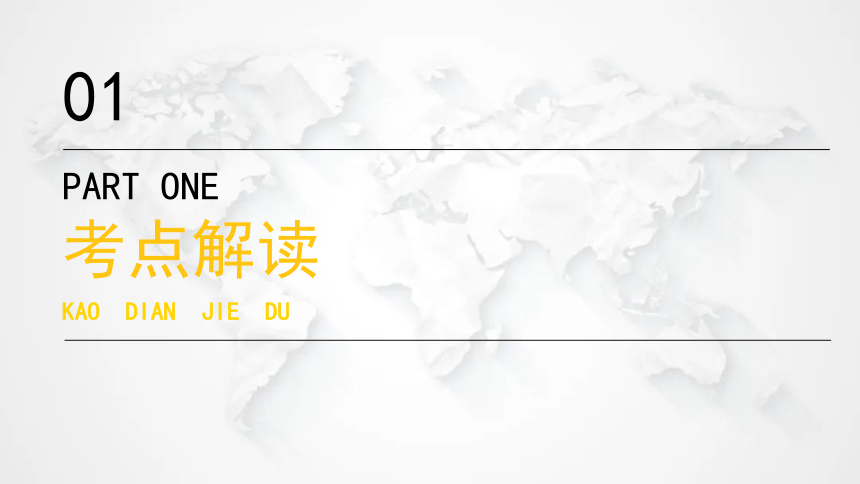
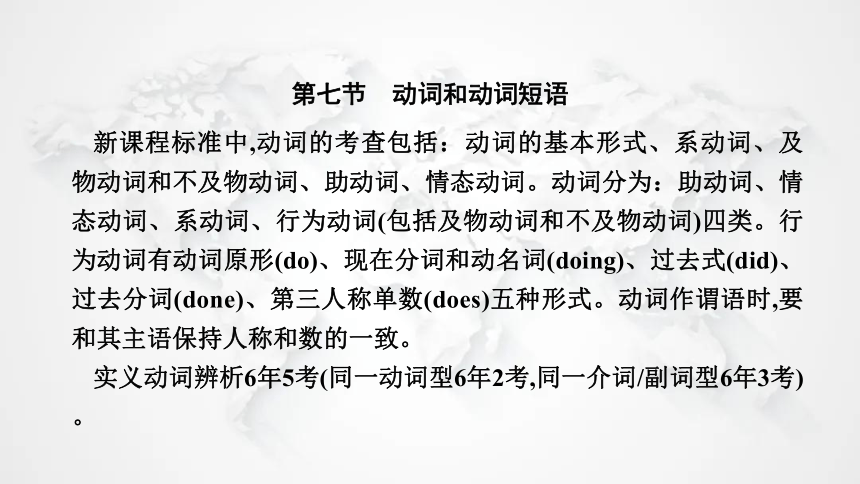

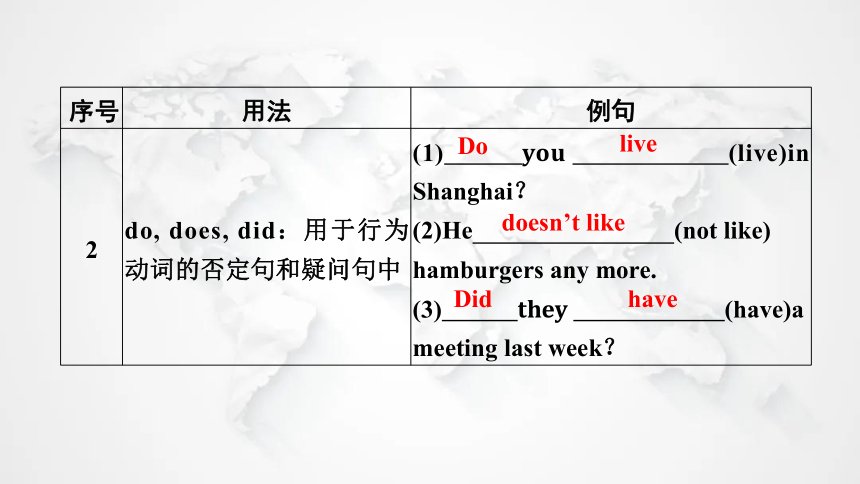
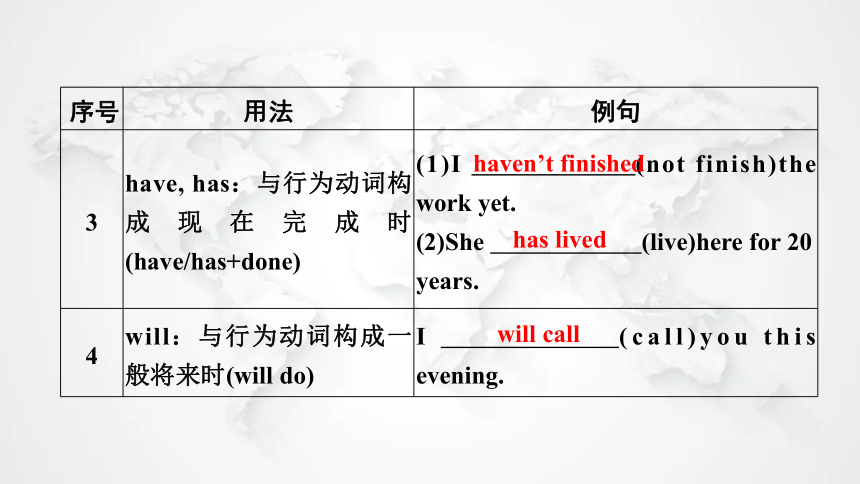
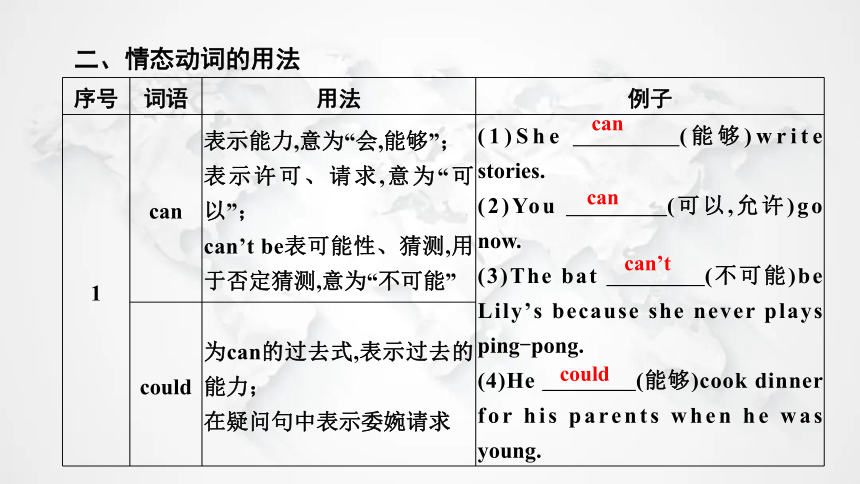
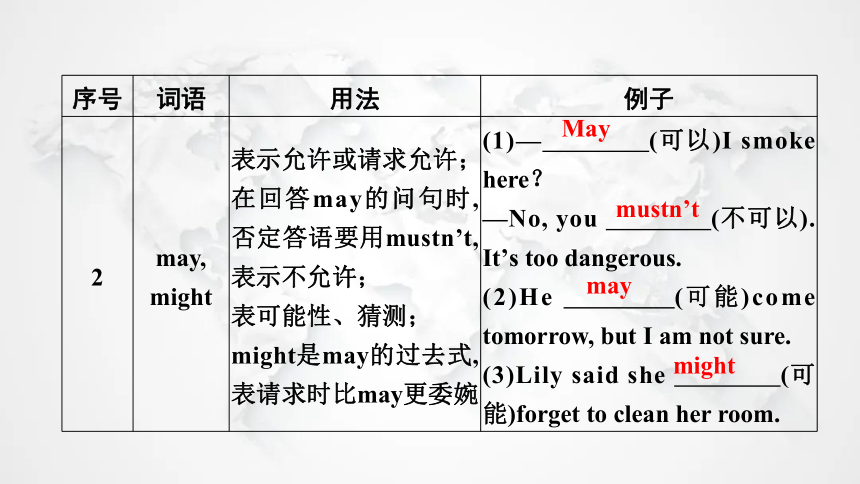
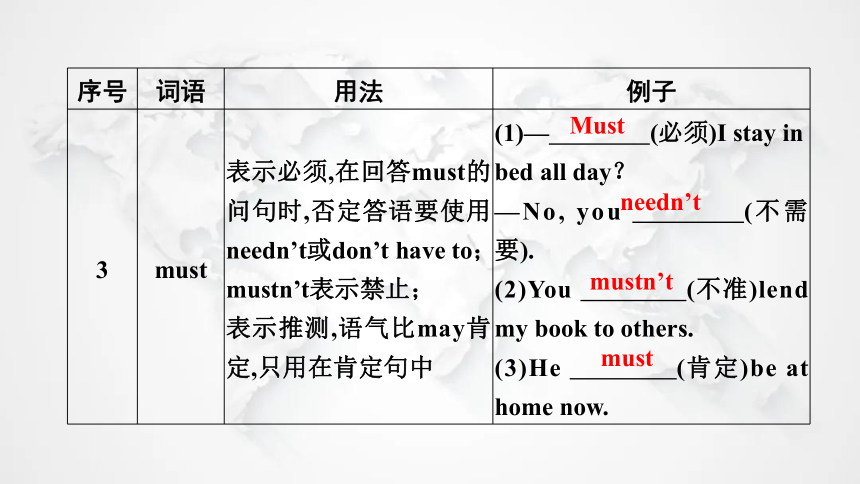
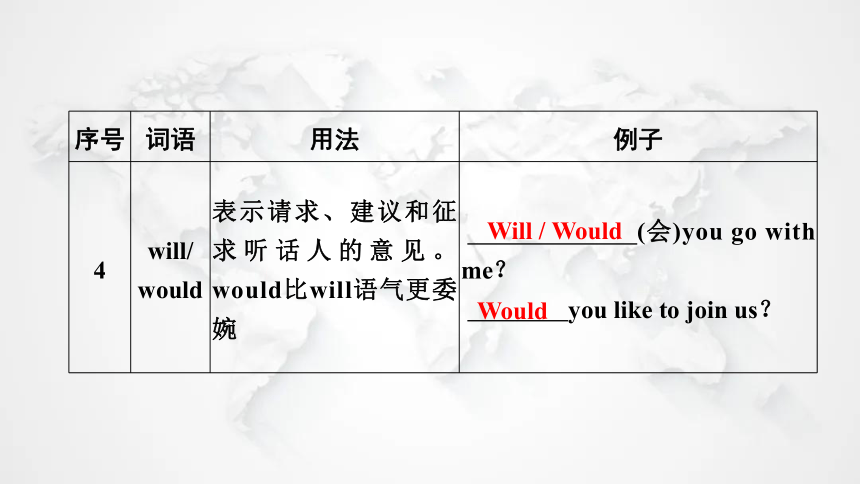
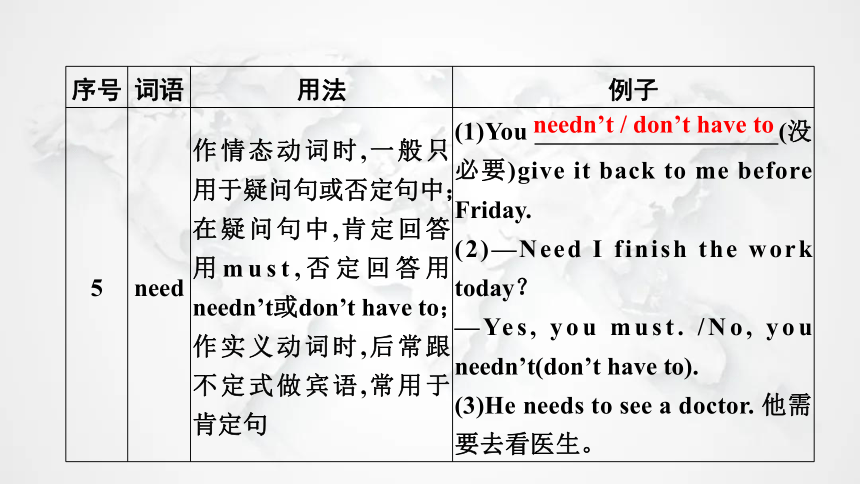
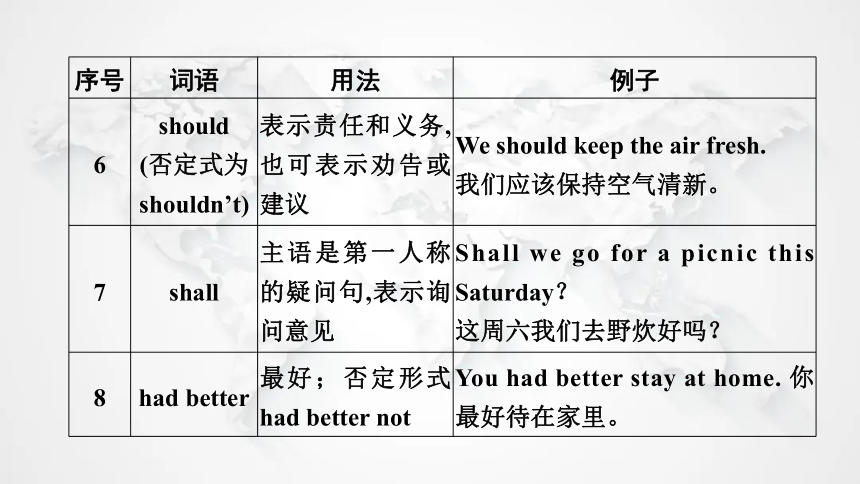
文档简介
(共60张PPT)
考点解读
01
KAO DIAN JIE DU
满分突破
02
MAN FEN TU PO
真题链接
03
ZHEN TI LIAN JIE
CONTENTS
目录
模拟突破
04
MO NI TU PO
考点解读
KAO DIAN JIE DU
PART ONE
01
第七节 动词和动词短语
新课程标准中,动词的考查包括:动词的基本形式、系动词、及物动词和不及物动词、助动词、情态动词。动词分为:助动词、情态动词、系动词、行为动词(包括及物动词和不及物动词)四类。行为动词有动词原形(do)、现在分词和动名词(doing)、过去式(did)、过去分词(done)、第三人称单数(does)五种形式。动词作谓语时,要和其主语保持人称和数的一致。
实义动词辨析6年5考(同一动词型6年2考,同一介词/副词型6年3考)。
一、助动词的用法
序号 用法 例句
1 be(am, is, are, was, were):与行为动词构成现在进行时、过去进行时(be+doing)或者被动语态(be+done) (1)We working hard in the garden at the moment.
(2)He doing his homework at 9:00 last night.
(3)English spoken in Canada.
are
was
is
序号 用法 例句
2 do, does, did:用于行为动词的否定句和疑问句中 (1) you (live)in Shanghai?
(2)He (not like)
hamburgers any more.
(3) they (have)a meeting last week?
Do
live
doesn’t like
Did
have
序号 用法 例句
3 have, has:与行为动词构成现在完成时(have/has+done) (1)I (not finish)the work yet.
(2)She (live)here for 20 years.
4 will:与行为动词构成一般将来时(will do) I (call)you this evening.
haven’t finished
has lived
will call
二、情态动词的用法
序号 词语 用法 例子
1 can 表示能力,意为“会,能够”;
表示许可、请求,意为“可以”;
can’t be表可能性、猜测,用于否定猜测,意为“不可能” (1)She (能够)write stories.
(2)You (可以,允许)go now.
(3)The bat (不可能)be Lily’s because she never plays ping-pong.
(4)He (能够)cook dinner for his parents when he was young.
could 为can的过去式,表示过去的能力;
在疑问句中表示委婉请求
can
can
can’t
could
序号 词语 用法 例子
2 may,
might 表示允许或请求允许;
在回答may的问句时,否定答语要用mustn’t,表示不允许;
表可能性、猜测;
might是may的过去式,表请求时比may更委婉 (1)— (可以)I smoke here?
—No, you (不可以). It’s too dangerous.
(2)He (可能)come tomorrow, but I am not sure.
(3)Lily said she (可能)forget to clean her room.
May
mustn’t
may
might
序号 词语 用法 例子
3 must 表示必须,在回答must的问句时,否定答语要使用needn’t或don’t have to;
mustn’t表示禁止;
表示推测,语气比may肯定,只用在肯定句中 (1)— (必须)I stay in bed all day?
—No, you (不需要).
(2)You (不准)lend my book to others.
(3)He (肯定)be at home now.
Must
needn’t
mustn’t
must
序号 词语 用法 例子
4 will/
would 表示请求、建议和征求听话人的意见。would比will语气更委婉 (会)you go with me?
you like to join us?
Will / Would
Would
序号 词语 用法 例子
5 need 作情态动词时,一般只用于疑问句或否定句中;
在疑问句中,肯定回答用must,否定回答用needn’t或don’t have to;
作实义动词时,后常跟不定式做宾语,常用于肯定句 (1)You (没必要)give it back to me before Friday.
(2)—Need I finish the work today?
—Yes, you must. /No, you needn’t(don’t have to).
(3)He needs to see a doctor. 他需要去看医生。
needn’t / don’t have to
序号 词语 用法 例子
6 should
(否定式为
shouldn’t) 表示责任和义务,也可表示劝告或建议 We should keep the air fresh.
我们应该保持空气清新。
7 shall 主语是第一人称的疑问句,表示询问意见 Shall we go for a picnic this Saturday?
这周六我们去野炊好吗?
8 had better 最好;否定形式had better not You had better stay at home. 你最好待在家里。
三、系动词的用法
作为系动词,有些不具词义;有些具有词义,但不能单独用作谓语,后边必须跟表语构成系表结构,说明主语的状况、性质、特征等情况。主要有:be, look, taste, smell, sound, feel, get, become, grow, turn, go, fall, come, keep, stay, remain, seem, appear等。
序号 状态系动词(be动词) 例子
1 (1)形式一般会随人称及时态的变化而变化
(2)后面接名词、代词、数词、介词或形容词等 ①She a nurse.
②I tired. you tired, too?
③He got up late and___________
late for school.
④They began to learn English when they 6 years old.
is
am
Are
was
were
序号 感官系动词 例子
2
(1)感官系动词有:look, taste, smell, sound, feel等
(2)后面接形容词
(3)表示“看(听,闻……)起来像……”的结构:look/sound/smell like,后面接名词或代词 ①The sculptures (看)real.
②The mooncake (尝)good.
③It (闻起来像)
chocolate.
④What does it (听起来像)?
look
tastes
smells like
sound like
序号 变化系动词 例子
3 (1)变化系动词有:get, become, grow, turn, go, fall, come
(2)become多指身份、职位或状态等的变化,后面接名词或形容词,或用于天气变暖或变冷,天变长或变短
turn一般用于表示颜色的变化
get一般用于天变黑或变亮,此时也可用grow,天气变暖或变冷,天变长或变短,此时也可用become
grow一般用于某段时间的心情变化
go由某种状态向另一种状态转变,后面多接形容词作其表语,此类形容词往往意义不佳 ①When winter comes, the days__________
(变短).
②My computer has (出毛病).
③The leaves (变绿)when spring comes.
④He (成为)a teacher when he was 20.
⑤Her mother (变得)angry when she heard the news.
⑥His dream true(实现)at last.
⑦As time went on,he more and more impatient. 随着时间的流逝,他变得越来越没有耐心了。
get shorter
gone wrong
turn green
became
got / became
came
became
序号 持续系动词 例子
4 (1)用来表示主语继续或保持一种状况或态度
(2)主要有keep, stay, remain, 后接形容词 ①You must (保持安静)in the library.
②Whatever achievements you’ve made, you should remain modest. 无论你取得多么大的成就,你都该保持谦虚。
keep quiet
序号 表像系动词 例子
5 (1)用来表示“看起来像”这一概念
(2)主要有look, seem,
appear, 后接形容词 ①He tired. 他看起来很累。
②He (to be)very sad. 他看起来很伤心。
looks
seems
四、实义动词(行为动词)的用法
行为动词分为及物动词(vt. )和不及物动词(vi. )。
及物动词后面加宾语意义才完整,有被动语态。
如:
I want two apples. 我想要两个苹果。(动词+宾语)
May I ask you a question? 我可以问你一个问题吗?(动词+宾语+宾补)
2. 不及物动词后不接宾语,没有被动语态,但与介词连用时,后面可接宾语。
如:The accident happened last night. 这场事故发生在昨晚。
The boy looked after his sister well. 这个男孩把他妹妹照顾得很好。
3. 同一动词有时可用作及物动词,有时可用作不及物动词。
如:She can sing and dance. 她能歌善舞。(sing用作不及物动词)
She can sing many English songs. 她能唱好多首英文歌曲。(sing用作及物动词)
五、动词短语
动词短语是中考必考点之一, 基本有下列几种构成:
1. 动词+介词, 如:
Mary is looking for her eraser everywhere now. 玛丽正在四处找她的橡皮。
2. 动词+副词, 如:
Remember to turn off the light when you leave the room. 离开房间时记得关灯。
=Remember to turn the light off when you leave the room.
Look, there is a pen on the floor. Please pick it up. 看,地上有支笔,请把它捡起来。
注意:动副搭配的短语中,代词作宾语时应放在动词后,副词前。当宾语是名词时,该名词放在副词的前后都可以。
3. 动词+副词+介词,如:
We are looking forward to your coming. 我们期待你的到来。
六、易错点突破
(一)情态动词
1. 情态动词的位置:情态动词在句中放在行为动词之前;在疑问句中,情态动词则在主语之前。
你一次可以借两本书。
You can keep two books each time.
(1)否定句:_________________________________________________________________
(2)一般疑问句:____________________________________________
You can’t keep two books each time.
Can I keep two books each time?
2. 情态动词不能单独使用,后面需接动词原形,没有人称和数的变化。如:
You had better not make a noise. 你最好不要吵闹。
He can speak English well and he is able to sing many English songs. 他英语说得很好,还能唱很多英文歌曲。
(二)使用系动词时要注意以下几个问题:
1. look, taste, smell, get, stay, go等既可作系动词,后接形容词,又可作行为动词,后接副词修饰。如:
She looked excited when she won the prize. 获奖时, 她看起来很激动。
She looked up and down carefully and tried to find something special. 她仔细地上下打量, 试图找到一些特别的东西。
2. 除be外,其余的系动词的疑问式或否定式,要借助助动词。如:
The cake doesn’t taste good. 这个蛋糕不好吃。
Does he look like his father? 他长得像他父亲吗?
(三)动词加介词或副词,构成动词短语。
人称代词作动词短语的宾语时,放在介词后、副词前;名词作宾语时,可以都放在后面。如:
You can look it up in the dictionary. 你可以在词典里查到它。
Please write down your name. =Please write your name down. 请写下你的姓名。
满分突破
MAN FEN TU PO
PART TWO
02
一、动词和动词短语在语法选择中的考查
在语法选择中,动词的考查主要是动词时态、语态(被动语态)、动词搭配(非谓语)以及情态动词。情态动词主要考查can, could, may, might, must, have to, need, should, will, would, had better的用法。
1. (2023 · 广州中考·11题)He eat big meals and did not go hungry any more.
A. could B. might C. should D. must
2. (2020·广州中考·3题)Soon the house is filled with books. His wife,Alice,is angry. “You do something!”
A. must B. could C. would D. may
A
A
3. (2019·广州中考·9题)For their great service, we forget these animals.
A. shouldn’t B. may not C. don’t have to D. needn’t
4. (2023·广州市海珠区一模)There Fisher tried his best to hit the Sky’s floor, but he made only a tiny scratch (抓痕). He____________ break through to Sky.
A. mustn’t B. shouldn’t C. couldn’t D. needn’t
A
C
5. (2023 · 广州市花都区二模)When the water in the rice fields is 60-80 centimeters deep, it even be used to raise fishes.
A. can B. may C. must D. should
A
二、动词和动词短语在短文填空中的考查
在短文填空中,动词基本依靠上下文的语境推断出来。近五年都涉及考查常见动词以及含动词的固定搭配。填入动词时注意时态和数的变化。
1. (2022· 广东·73题)People there like to tea with sugar or milk in it.
2. (2021· 广东·68题)His Chinese friends him “Lao Pan”.
drink
call
3. (2021· 广东·69题)In 1988,Lao Pan first came to China and ______ as a teacher at a university.
4. (2021· 广东·71题)These experiences in China gave him ideas for his books. Since then, he has thirteen books about China.
worked
written / published
5. (2023·佛山市顺德区一模)Jane also cleaned Mrs. Wilson’s yard and swept her sidewalk (行道) for two dollars. Jane the Steeles’ dog after washing it.
6. (2023·惠州市惠阳区二模)He dreamed of making a car. He______ much attention to the development of cars.
walked
paid
7. (2023· 佛山市二模)I most of my holiday practising skiing. I had a wonderful time.
8. (2023·珠海市香洲区二模)Humans need to such kind of problems. There’s still a long way to go.
spent
solve
9. (2023·江门市校考二模)You work hard to become a useful person so that you can benefit (有益于) society, just like when the peach and plum trees bloom and yield fruit (开花结果).
10. (2023·佛山市顺德区二模改编)Some are quite nice, and we _____ hear lovely songs from them.
should
can
真题链接
ZHEN TI LIAN JIE
PART THREE
03
中考解读 解读中考
一、动词和动词短语辨析
( )1. Paper cut-outs of “double happiness” are often_________
in the married couple’s home to bring good wishes. (2023·扬州市)
A. put back B. put up
C. put on D. put off
B
( )2. It’s a good habit to the lights when you leave a room. (2023·云南省)
A. turn down B. turn up C. turn off D. turn on
( )3. — How do you usually go to Wuhan from here?
— By high-speed train. It me only 20 minutes to get there. (2023·鄂州市)
A. spends B. pays C. costs D. takes
C
D
( )4. — Sally into the role of our group leader.
— Really? I’m expecting fresh air and new ideas from her. (2023·武汉市)
A. ran B. broke C. stepped D. looked
C
( )5. The smell of the sea memories of his childhood. (2023·营口市)
A. called at B. called off
C. called up D. called on
C
( )6. — Hard to believe. Luke won the school speech contest!
— He used to be shy, but his friends’ support his confidence. (2023·武汉市)
A. took away B. made up C. put away D. built up
D
( )7. — Are you ready for the show?
— No. It’s easy to a play but difficult to act it out. (2023·青岛市)
A. make up B. take up C. look up D. put up
A
( )8. — Shall we go to the nature park this weekend?
— Good idea. We can fresh air in the park. (2023·襄阳市)
A. take up B. take down C. take in D. take off
C
( )9. The teacher tells students to new words in a dictionary. (2023·岳阳市)
A. look after B. look up C. look for
( )10. Tina her sunglasses on the beach because the sunlight was so strong.
(2023·阜新市)
A. put up B. put on C. put away D. put down
B
B
二、情态动词
( )1. — Would you like to visit Tianjin University tomorrow?
— Sorry, I’m afraid I . I’ll work as a volunteer in my community. (2023·天津市)
A. can B. can’t C. must D. mustn’t
B
( )2. — The paper cutting is pretty lively. Who made it?
— It be Mary. None of us except her is able to do it. (2023·滨州市)
A. can B. must C. need D. might
B
( )3. — Excuse me, but we wait in line to get on the subway.
— I’m sorry. (2023·武汉市)
A. might B. would C. could D. should
D
( )4. — I join the volunteer program on weekends?
— Of course you can. (2023·怀化市)
A. Can B. Must C. Should
A
( )5. — Jack, could you please help me take out the trash?
— Sorry, I ,mom. I my homework now. (2023·达州市)
A. couldn’t; am doing
B. can’t; am doing
C. can’t; do
B
( )6. — You take the subway to the airport, for I can drive you there directly.
— That’s very kind of you. (2023·荆州市)
A. can’t B. needn’t C. mustn’t D. shouldn’t
B
( )7. — Is Tony coming to the book show this Sunday?
— I’m not sure. He not come. (2023·甘孜市)
A. may B. should C. must D. need
A
( )8. — Students listen to music while they are riding bikes on the road.
— I agree with you. It’s too dangerous. (2023·朝阳市)
A. don’t have to B. may not
C. mustn’t D. needn’t
C
( )9. — Where are you going this summer vacation?
— I go to Zibo, but I’m not sure. (2023·菏泽市)
A. must B. needn’t C. might
( )10. — Must I stay here and wait for you?
— No, you . You can go home now. (2023·北京市)
A. needn’t B. can’t C. mustn’t D. shouldn’t
C
A
模拟突破
MO NI TU PO
PART FOUR
04
语法选择(主要考查动词)(2023·揭阳市二模改编)
The United Nations announced on April 19,2023 that India is going to become the most populous (人口稠密的) country in the world by 1 end of June. In 2022,India had 2 than 1.412 billion people, which is very close to China’s population of 1.426 billion people. India’s population 3 to grow to almost 1.43 billion by the middle of the year, going beyond China’s.
This big population 4 be both good and bad for India. It’s good because more people can work and help the economy (经济) panies 5 other countries and areas might also want to invest (投资) in India, the Associated Press noted. But having so many people also has 6 . There 7 not be enough food, healthcare and education for everyone. It can be hard to find jobs because there are too many people 8 work, CNN reported.
However, India still has many chances for 9 growth. Many manufacturing (制造业) companies are setting up factories in India. And India 10 become the world’s third-biggest economy by 2027,according to Morgan Stanley, the investment bank.
( )1. A. a B. an C. the
( )2. A. much B. more C. most
( )3. A. expects B. expected C. is expected
( )4. A. can B. could C. should
( )5. A. from B. behind C. into
( )6. A. challenge B. challenges C. challenge’s
( )7. A. must B. might C. can
( )8. A. look for B. to look for C. looking for
( )9. A. it B. its C. itself
( )10. A. may B. can C. should
C
B
C
A
A
B
B
C
B
A
考点解读
01
KAO DIAN JIE DU
满分突破
02
MAN FEN TU PO
真题链接
03
ZHEN TI LIAN JIE
CONTENTS
目录
模拟突破
04
MO NI TU PO
考点解读
KAO DIAN JIE DU
PART ONE
01
第七节 动词和动词短语
新课程标准中,动词的考查包括:动词的基本形式、系动词、及物动词和不及物动词、助动词、情态动词。动词分为:助动词、情态动词、系动词、行为动词(包括及物动词和不及物动词)四类。行为动词有动词原形(do)、现在分词和动名词(doing)、过去式(did)、过去分词(done)、第三人称单数(does)五种形式。动词作谓语时,要和其主语保持人称和数的一致。
实义动词辨析6年5考(同一动词型6年2考,同一介词/副词型6年3考)。
一、助动词的用法
序号 用法 例句
1 be(am, is, are, was, were):与行为动词构成现在进行时、过去进行时(be+doing)或者被动语态(be+done) (1)We working hard in the garden at the moment.
(2)He doing his homework at 9:00 last night.
(3)English spoken in Canada.
are
was
is
序号 用法 例句
2 do, does, did:用于行为动词的否定句和疑问句中 (1) you (live)in Shanghai?
(2)He (not like)
hamburgers any more.
(3) they (have)a meeting last week?
Do
live
doesn’t like
Did
have
序号 用法 例句
3 have, has:与行为动词构成现在完成时(have/has+done) (1)I (not finish)the work yet.
(2)She (live)here for 20 years.
4 will:与行为动词构成一般将来时(will do) I (call)you this evening.
haven’t finished
has lived
will call
二、情态动词的用法
序号 词语 用法 例子
1 can 表示能力,意为“会,能够”;
表示许可、请求,意为“可以”;
can’t be表可能性、猜测,用于否定猜测,意为“不可能” (1)She (能够)write stories.
(2)You (可以,允许)go now.
(3)The bat (不可能)be Lily’s because she never plays ping-pong.
(4)He (能够)cook dinner for his parents when he was young.
could 为can的过去式,表示过去的能力;
在疑问句中表示委婉请求
can
can
can’t
could
序号 词语 用法 例子
2 may,
might 表示允许或请求允许;
在回答may的问句时,否定答语要用mustn’t,表示不允许;
表可能性、猜测;
might是may的过去式,表请求时比may更委婉 (1)— (可以)I smoke here?
—No, you (不可以). It’s too dangerous.
(2)He (可能)come tomorrow, but I am not sure.
(3)Lily said she (可能)forget to clean her room.
May
mustn’t
may
might
序号 词语 用法 例子
3 must 表示必须,在回答must的问句时,否定答语要使用needn’t或don’t have to;
mustn’t表示禁止;
表示推测,语气比may肯定,只用在肯定句中 (1)— (必须)I stay in bed all day?
—No, you (不需要).
(2)You (不准)lend my book to others.
(3)He (肯定)be at home now.
Must
needn’t
mustn’t
must
序号 词语 用法 例子
4 will/
would 表示请求、建议和征求听话人的意见。would比will语气更委婉 (会)you go with me?
you like to join us?
Will / Would
Would
序号 词语 用法 例子
5 need 作情态动词时,一般只用于疑问句或否定句中;
在疑问句中,肯定回答用must,否定回答用needn’t或don’t have to;
作实义动词时,后常跟不定式做宾语,常用于肯定句 (1)You (没必要)give it back to me before Friday.
(2)—Need I finish the work today?
—Yes, you must. /No, you needn’t(don’t have to).
(3)He needs to see a doctor. 他需要去看医生。
needn’t / don’t have to
序号 词语 用法 例子
6 should
(否定式为
shouldn’t) 表示责任和义务,也可表示劝告或建议 We should keep the air fresh.
我们应该保持空气清新。
7 shall 主语是第一人称的疑问句,表示询问意见 Shall we go for a picnic this Saturday?
这周六我们去野炊好吗?
8 had better 最好;否定形式had better not You had better stay at home. 你最好待在家里。
三、系动词的用法
作为系动词,有些不具词义;有些具有词义,但不能单独用作谓语,后边必须跟表语构成系表结构,说明主语的状况、性质、特征等情况。主要有:be, look, taste, smell, sound, feel, get, become, grow, turn, go, fall, come, keep, stay, remain, seem, appear等。
序号 状态系动词(be动词) 例子
1 (1)形式一般会随人称及时态的变化而变化
(2)后面接名词、代词、数词、介词或形容词等 ①She a nurse.
②I tired. you tired, too?
③He got up late and___________
late for school.
④They began to learn English when they 6 years old.
is
am
Are
was
were
序号 感官系动词 例子
2
(1)感官系动词有:look, taste, smell, sound, feel等
(2)后面接形容词
(3)表示“看(听,闻……)起来像……”的结构:look/sound/smell like,后面接名词或代词 ①The sculptures (看)real.
②The mooncake (尝)good.
③It (闻起来像)
chocolate.
④What does it (听起来像)?
look
tastes
smells like
sound like
序号 变化系动词 例子
3 (1)变化系动词有:get, become, grow, turn, go, fall, come
(2)become多指身份、职位或状态等的变化,后面接名词或形容词,或用于天气变暖或变冷,天变长或变短
turn一般用于表示颜色的变化
get一般用于天变黑或变亮,此时也可用grow,天气变暖或变冷,天变长或变短,此时也可用become
grow一般用于某段时间的心情变化
go由某种状态向另一种状态转变,后面多接形容词作其表语,此类形容词往往意义不佳 ①When winter comes, the days__________
(变短).
②My computer has (出毛病).
③The leaves (变绿)when spring comes.
④He (成为)a teacher when he was 20.
⑤Her mother (变得)angry when she heard the news.
⑥His dream true(实现)at last.
⑦As time went on,he more and more impatient. 随着时间的流逝,他变得越来越没有耐心了。
get shorter
gone wrong
turn green
became
got / became
came
became
序号 持续系动词 例子
4 (1)用来表示主语继续或保持一种状况或态度
(2)主要有keep, stay, remain, 后接形容词 ①You must (保持安静)in the library.
②Whatever achievements you’ve made, you should remain modest. 无论你取得多么大的成就,你都该保持谦虚。
keep quiet
序号 表像系动词 例子
5 (1)用来表示“看起来像”这一概念
(2)主要有look, seem,
appear, 后接形容词 ①He tired. 他看起来很累。
②He (to be)very sad. 他看起来很伤心。
looks
seems
四、实义动词(行为动词)的用法
行为动词分为及物动词(vt. )和不及物动词(vi. )。
及物动词后面加宾语意义才完整,有被动语态。
如:
I want two apples. 我想要两个苹果。(动词+宾语)
May I ask you a question? 我可以问你一个问题吗?(动词+宾语+宾补)
2. 不及物动词后不接宾语,没有被动语态,但与介词连用时,后面可接宾语。
如:The accident happened last night. 这场事故发生在昨晚。
The boy looked after his sister well. 这个男孩把他妹妹照顾得很好。
3. 同一动词有时可用作及物动词,有时可用作不及物动词。
如:She can sing and dance. 她能歌善舞。(sing用作不及物动词)
She can sing many English songs. 她能唱好多首英文歌曲。(sing用作及物动词)
五、动词短语
动词短语是中考必考点之一, 基本有下列几种构成:
1. 动词+介词, 如:
Mary is looking for her eraser everywhere now. 玛丽正在四处找她的橡皮。
2. 动词+副词, 如:
Remember to turn off the light when you leave the room. 离开房间时记得关灯。
=Remember to turn the light off when you leave the room.
Look, there is a pen on the floor. Please pick it up. 看,地上有支笔,请把它捡起来。
注意:动副搭配的短语中,代词作宾语时应放在动词后,副词前。当宾语是名词时,该名词放在副词的前后都可以。
3. 动词+副词+介词,如:
We are looking forward to your coming. 我们期待你的到来。
六、易错点突破
(一)情态动词
1. 情态动词的位置:情态动词在句中放在行为动词之前;在疑问句中,情态动词则在主语之前。
你一次可以借两本书。
You can keep two books each time.
(1)否定句:_________________________________________________________________
(2)一般疑问句:____________________________________________
You can’t keep two books each time.
Can I keep two books each time?
2. 情态动词不能单独使用,后面需接动词原形,没有人称和数的变化。如:
You had better not make a noise. 你最好不要吵闹。
He can speak English well and he is able to sing many English songs. 他英语说得很好,还能唱很多英文歌曲。
(二)使用系动词时要注意以下几个问题:
1. look, taste, smell, get, stay, go等既可作系动词,后接形容词,又可作行为动词,后接副词修饰。如:
She looked excited when she won the prize. 获奖时, 她看起来很激动。
She looked up and down carefully and tried to find something special. 她仔细地上下打量, 试图找到一些特别的东西。
2. 除be外,其余的系动词的疑问式或否定式,要借助助动词。如:
The cake doesn’t taste good. 这个蛋糕不好吃。
Does he look like his father? 他长得像他父亲吗?
(三)动词加介词或副词,构成动词短语。
人称代词作动词短语的宾语时,放在介词后、副词前;名词作宾语时,可以都放在后面。如:
You can look it up in the dictionary. 你可以在词典里查到它。
Please write down your name. =Please write your name down. 请写下你的姓名。
满分突破
MAN FEN TU PO
PART TWO
02
一、动词和动词短语在语法选择中的考查
在语法选择中,动词的考查主要是动词时态、语态(被动语态)、动词搭配(非谓语)以及情态动词。情态动词主要考查can, could, may, might, must, have to, need, should, will, would, had better的用法。
1. (2023 · 广州中考·11题)He eat big meals and did not go hungry any more.
A. could B. might C. should D. must
2. (2020·广州中考·3题)Soon the house is filled with books. His wife,Alice,is angry. “You do something!”
A. must B. could C. would D. may
A
A
3. (2019·广州中考·9题)For their great service, we forget these animals.
A. shouldn’t B. may not C. don’t have to D. needn’t
4. (2023·广州市海珠区一模)There Fisher tried his best to hit the Sky’s floor, but he made only a tiny scratch (抓痕). He____________ break through to Sky.
A. mustn’t B. shouldn’t C. couldn’t D. needn’t
A
C
5. (2023 · 广州市花都区二模)When the water in the rice fields is 60-80 centimeters deep, it even be used to raise fishes.
A. can B. may C. must D. should
A
二、动词和动词短语在短文填空中的考查
在短文填空中,动词基本依靠上下文的语境推断出来。近五年都涉及考查常见动词以及含动词的固定搭配。填入动词时注意时态和数的变化。
1. (2022· 广东·73题)People there like to tea with sugar or milk in it.
2. (2021· 广东·68题)His Chinese friends him “Lao Pan”.
drink
call
3. (2021· 广东·69题)In 1988,Lao Pan first came to China and ______ as a teacher at a university.
4. (2021· 广东·71题)These experiences in China gave him ideas for his books. Since then, he has thirteen books about China.
worked
written / published
5. (2023·佛山市顺德区一模)Jane also cleaned Mrs. Wilson’s yard and swept her sidewalk (行道) for two dollars. Jane the Steeles’ dog after washing it.
6. (2023·惠州市惠阳区二模)He dreamed of making a car. He______ much attention to the development of cars.
walked
paid
7. (2023· 佛山市二模)I most of my holiday practising skiing. I had a wonderful time.
8. (2023·珠海市香洲区二模)Humans need to such kind of problems. There’s still a long way to go.
spent
solve
9. (2023·江门市校考二模)You work hard to become a useful person so that you can benefit (有益于) society, just like when the peach and plum trees bloom and yield fruit (开花结果).
10. (2023·佛山市顺德区二模改编)Some are quite nice, and we _____ hear lovely songs from them.
should
can
真题链接
ZHEN TI LIAN JIE
PART THREE
03
中考解读 解读中考
一、动词和动词短语辨析
( )1. Paper cut-outs of “double happiness” are often_________
in the married couple’s home to bring good wishes. (2023·扬州市)
A. put back B. put up
C. put on D. put off
B
( )2. It’s a good habit to the lights when you leave a room. (2023·云南省)
A. turn down B. turn up C. turn off D. turn on
( )3. — How do you usually go to Wuhan from here?
— By high-speed train. It me only 20 minutes to get there. (2023·鄂州市)
A. spends B. pays C. costs D. takes
C
D
( )4. — Sally into the role of our group leader.
— Really? I’m expecting fresh air and new ideas from her. (2023·武汉市)
A. ran B. broke C. stepped D. looked
C
( )5. The smell of the sea memories of his childhood. (2023·营口市)
A. called at B. called off
C. called up D. called on
C
( )6. — Hard to believe. Luke won the school speech contest!
— He used to be shy, but his friends’ support his confidence. (2023·武汉市)
A. took away B. made up C. put away D. built up
D
( )7. — Are you ready for the show?
— No. It’s easy to a play but difficult to act it out. (2023·青岛市)
A. make up B. take up C. look up D. put up
A
( )8. — Shall we go to the nature park this weekend?
— Good idea. We can fresh air in the park. (2023·襄阳市)
A. take up B. take down C. take in D. take off
C
( )9. The teacher tells students to new words in a dictionary. (2023·岳阳市)
A. look after B. look up C. look for
( )10. Tina her sunglasses on the beach because the sunlight was so strong.
(2023·阜新市)
A. put up B. put on C. put away D. put down
B
B
二、情态动词
( )1. — Would you like to visit Tianjin University tomorrow?
— Sorry, I’m afraid I . I’ll work as a volunteer in my community. (2023·天津市)
A. can B. can’t C. must D. mustn’t
B
( )2. — The paper cutting is pretty lively. Who made it?
— It be Mary. None of us except her is able to do it. (2023·滨州市)
A. can B. must C. need D. might
B
( )3. — Excuse me, but we wait in line to get on the subway.
— I’m sorry. (2023·武汉市)
A. might B. would C. could D. should
D
( )4. — I join the volunteer program on weekends?
— Of course you can. (2023·怀化市)
A. Can B. Must C. Should
A
( )5. — Jack, could you please help me take out the trash?
— Sorry, I ,mom. I my homework now. (2023·达州市)
A. couldn’t; am doing
B. can’t; am doing
C. can’t; do
B
( )6. — You take the subway to the airport, for I can drive you there directly.
— That’s very kind of you. (2023·荆州市)
A. can’t B. needn’t C. mustn’t D. shouldn’t
B
( )7. — Is Tony coming to the book show this Sunday?
— I’m not sure. He not come. (2023·甘孜市)
A. may B. should C. must D. need
A
( )8. — Students listen to music while they are riding bikes on the road.
— I agree with you. It’s too dangerous. (2023·朝阳市)
A. don’t have to B. may not
C. mustn’t D. needn’t
C
( )9. — Where are you going this summer vacation?
— I go to Zibo, but I’m not sure. (2023·菏泽市)
A. must B. needn’t C. might
( )10. — Must I stay here and wait for you?
— No, you . You can go home now. (2023·北京市)
A. needn’t B. can’t C. mustn’t D. shouldn’t
C
A
模拟突破
MO NI TU PO
PART FOUR
04
语法选择(主要考查动词)(2023·揭阳市二模改编)
The United Nations announced on April 19,2023 that India is going to become the most populous (人口稠密的) country in the world by 1 end of June. In 2022,India had 2 than 1.412 billion people, which is very close to China’s population of 1.426 billion people. India’s population 3 to grow to almost 1.43 billion by the middle of the year, going beyond China’s.
This big population 4 be both good and bad for India. It’s good because more people can work and help the economy (经济) panies 5 other countries and areas might also want to invest (投资) in India, the Associated Press noted. But having so many people also has 6 . There 7 not be enough food, healthcare and education for everyone. It can be hard to find jobs because there are too many people 8 work, CNN reported.
However, India still has many chances for 9 growth. Many manufacturing (制造业) companies are setting up factories in India. And India 10 become the world’s third-biggest economy by 2027,according to Morgan Stanley, the investment bank.
( )1. A. a B. an C. the
( )2. A. much B. more C. most
( )3. A. expects B. expected C. is expected
( )4. A. can B. could C. should
( )5. A. from B. behind C. into
( )6. A. challenge B. challenges C. challenge’s
( )7. A. must B. might C. can
( )8. A. look for B. to look for C. looking for
( )9. A. it B. its C. itself
( )10. A. may B. can C. should
C
B
C
A
A
B
B
C
B
A
同课章节目录
- 词法
- 名词
- 动词和动词短语
- 动词语态
- 动词时态
- 助动词和情态动词
- 非谓语动词
- 冠词
- 代词
- 数词和量词
- 形容词副词及其比较等级
- 介词和介词短语
- 连词和感叹词
- 构词法
- 相似、相近词比较
- 句法
- 陈述句
- 一般疑问句和否定疑问句
- 特殊疑问句及选择疑问句
- 反意疑问句
- 存在句(There be句型)
- 宾语从句
- 定语从句
- 状语从句
- 主谓一致问题
- 简单句
- 并列句
- 复合句
- 主谓一致
- 主、表语从句
- 名词性从句
- 直接引语和间接引语
- 虚拟语气
- 感叹句
- 强调句
- 倒装句
- 祈使句
- 句子的成分
- 句子的分类
- 题型专区
- 单项选择部分
- 易错题
- 完形填空
- 阅读理解
- 词汇练习
- 听说训练
- 句型转换
- 补全对话
- 短文改错
- 翻译
- 书面表达
- 任务型阅读
- 语法填空
- 其他资料
